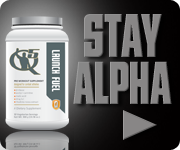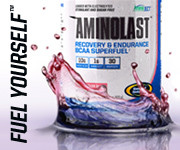Mary Bell
Mary Bell received her education as clinical dietitian from UT Southwestern Medical Center in 1993. She has been a sports and wellness dietitian for over 10 years in the Dallas area and currently runs Rudog, a website focused on specialized nutrition for fighters.
 Are you thinking about changing things up this year? Maybe you are ready for a new way of eating . Maybe you have thought about trying to eat clean all the time. (Do we really know what “eating clean” means? It seems to be a highly variable definition.) Maybe you have even wondered if becoming vegetarian is a good idea or not. There are definitely more fighters evaluating their diet options, and some are even departing from their “high protein” ways. Fighters are starting to explore eating styles that have previously been considered non-traditional for MMA, like vegetarianism and veganism. There are several fighters who are known for their vegetarian and vegan eating styles; Jake Shields, Frank Mir, and Mac Danzig, to name a few. If you are considering adopting a vegetarian way of eating, you will first have to decide exactly HOW vegetarian you are going to eat. There are so many variations. Some are super strict (like vegan) and some allow milk and eggs, but not beef and chicken. The type of vegetarianism you decide on will determine what foods you will have to focus on to make sure that you get enough protein and certain vitamins, like calcium, B12, and Iron.
Are you thinking about changing things up this year? Maybe you are ready for a new way of eating . Maybe you have thought about trying to eat clean all the time. (Do we really know what “eating clean” means? It seems to be a highly variable definition.) Maybe you have even wondered if becoming vegetarian is a good idea or not. There are definitely more fighters evaluating their diet options, and some are even departing from their “high protein” ways. Fighters are starting to explore eating styles that have previously been considered non-traditional for MMA, like vegetarianism and veganism. There are several fighters who are known for their vegetarian and vegan eating styles; Jake Shields, Frank Mir, and Mac Danzig, to name a few. If you are considering adopting a vegetarian way of eating, you will first have to decide exactly HOW vegetarian you are going to eat. There are so many variations. Some are super strict (like vegan) and some allow milk and eggs, but not beef and chicken. The type of vegetarianism you decide on will determine what foods you will have to focus on to make sure that you get enough protein and certain vitamins, like calcium, B12, and Iron.
If you are just going to be a straight forward vegetarian, at a minimum, you will not be eating ANY meat, fish, or poultry, dairy, or eggs. The good thing is this generally means that the overall diet will be lower in saturated fat and cholesterol, while higher in fiber, B vitamins and antioxidants. On the other hand, if not well planned, the vegetarian diet can be low or inadequate in B12, Iron, calcium, and omega 3 fatty acids. It becomes important to eat a variety of foods so that over a period of time there aren’t any risks of nutrient deficiencies. Aside from having to make sure that the diet is providing all of the vitamins a fighter needs, it is important to make sure that the diet also provides enough total calories for the amount and type of training a fighter will be doing. The typical MMA fighter needs to consume anywhere from 2000-4000 calories a day. This will depend greatly on height, weight, age, and training level. Unfortunately, many fighters have no idea how many calories they need to be eating, so they end up eating too few calories. Plus, since they are constantly cutting weight, they are always trying to eat even less. The vegetarian MMA fighter needs to know exactly what his or her caloric intake should be so that the diet can be designed to meet the need.
Let’s pretend we know a 28 yr old fighter named Jim who wants to become a vegetarian. He is 5ft 8inches and fights at 155 lbs. He used to walk around at 175, but since he has been working with Rudog he doesn’t do that anymore. He has adapted his training and diet to maintain his weight at 160. (He is soooo smart!) Now that he wants to be vegetarian, his diet will definitely change. His calorie needs are estimated to be around 2500 calories per day. Here is what a typical day might look like for him:
1 Whole Wheat English Muffin
1 tbsp Jelly
1 cup Orange Juice
1 cup Mixed fresh fruit topped with coconut flakes
¼ cup Homemade trail mix
12 oz Green tea
1 Veggie burger w/lettuce, tomato on whole wheat bun
1 oz Baked Lays
2 cups Mixed green salad w/ 1 tbs olive oil and balsamic vinegar
2 cups Spicy tofu with brown rice
2 cups Steamed veggies
1 cup Fresh fruit
2 cups Popcorn
12 oz Fruit smoothie made with soy milk
This meal plan ends up providing around 2500 calories, with 63% from carbs, 12% protein, and 25% fat. If you analyze if for vitamin and mineral content, it will not provide the recommended daily amounts of calcium, vitamin C, iron, B12, and others. This is because when dairy and eggs are eliminated, it becomes difficult to get those nutrients without some serious menu planning and rotation. Variety in food selection becomes extremely important. This particular meal plan did not include any dry beans or legumes, but doing so would certainly bump the nutrient value in several categories. The problem is most guys don’t want to eat beans every day, let alone for every meal. Not to mention the “GI distress” that comes with the territory. Oh, you WILL be gassier as a vegetarian, beans or no beans! That just comes with the territory. It is generally not a bad idea to take a multivitamin if you are eating vegetarian or vegan. You can also see where getting enough protein every day certainly takes some planning. This meal plan provides 12% and a good range is anywhere from 15-25% for fighters. A protein supplement would be an option to look at, or just make darn sure that there are high-protein foods consumed every day, like nuts, beans, hummus, egg substitutes, soy, and tofu. Where you have to be careful is the fat content of the diet. The vegetarian protein sources can be high in fat. It’s definitely a balancing act. If you choose to go the vegetarian route that does include dairy and eggs, it becomes MUCH simpler. The protein and calcium intake is less of a concern.
For the vegan, the challenges are a little more difficult because the food choices are much narrower. It can also become tempting to slide into a routine of eating the same thing all the time. This is certainly convenient, but over time can compromise the nutritional quality of the diet. When variety is limited, vitamin and mineral content is, too. The biggest challenges are getting enough absorbable iron and B12. These are best absorbed by the body when they are eaten from animal products, so getting them strictly from plant based foods is more difficult. The absorption rate of iron is greatly decreased when it is coming from plant based foods. Without the use of a high quality iron supplement the risk of anemia is high. It’s not a bad idea to have regular blood tests to make sure everything is ok.
Vegetarian diets are definitely possible for MMA athletes and fighters, but they do require a little more pre-planning and food preparation. Here are some things to think about if you are considering going vegetarian:
Pros
Lower in saturated fat
Higher in fiber
Lower in sodium
Lower in cholesterol
Greater intake of fruits and veggies
Cons
The diet can become higher in fat if cheese and dairy are used as main sources of protein and for flavor
Higher dairy intake can increase the intake of saturated fat
Foods can be more expensive
Fresh foods don’t last long and can be spoil before they are eaten.
You will need more time for frequent trips to grocery store and for food preparation.
Any time you are considering a significant diet change, it is a good idea to talk with a registered dietitian just to make sure that the diet is appropriate for you and what your fitness goals are.





